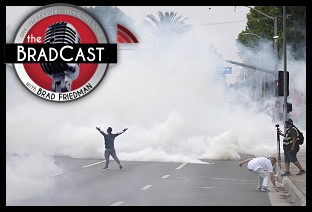 On Thursday we covered the announcement of hearings to be held by Rep. John Conyers (D-MI) in the House Judiciary Committee and by Sen. Russ Feingold (D-WI) in the Senate Judiciary Committee.
On Thursday we covered the announcement of hearings to be held by Rep. John Conyers (D-MI) in the House Judiciary Committee and by Sen. Russ Feingold (D-WI) in the Senate Judiciary Committee.
Conyers' hearing will look at the questions of legality surrounding Bush's "Signing Statements" and Feingold will look at issues surround de-funding the War in Iraq in advance of a legislative proposal to do just that. More details, and the expected witnesses for both of those hearings are in our previous article.
The BRAD BLOG has now obtained details from Feingold's office concerning what his proposal to exercise Congressional control of the purse strings over military deployment in Iraq will and won't do. A fact sheet concerning his upcoming legislation and how the defunding and re-deployment of U.S. troops would be conducted is below.
As well, the statement lists several other historical instances in which Congress voted to hold back funding while American troops were deployed, including in 1998 when the Republican-controlled legislature included a provision in a Defense Authorization bill prohibiting additional funding for U.S. troops in Bosnia after a date-certain, unless certain assurances were given to Congress by then-President Bill Clinton.
Feingold's fact-sheet follows in full...
U.S. Senator Russ Feingold will soon propose legislation to force the President to safely redeploy U.S. troops out of Iraq within six months of enactment.
Feingold’s legislation will:
- Prohibit the use of funds for the continued deployment of U.S. Armed forces to the Republic of Iraq after six months of enactment.
- Require the Administration to report to Congress a strategy for safely redeploying U.S. forces from Iraq within the six months prior to the fund termination date.
- Allow for specific exceptions to the prohibition including to:
- Conduct targeted counter-terrorism operations in Iraq.
- Allow a limited number of U.S. forces to conduct specific training for Iraqi security services.
- Provide security for U.S. infrastructure and civilian personnel.
Feingold’s legislation will not:
- Prohibit or restrict funds for the safe and orderly withdrawal of the Armed Forces personnel from Iraq.
- Prohibit or restrict funds for the troops remaining in Iraq for purposes listed above.
- Prohibit funds for any department or agency of the Government of the United States to carry out political, economic, or general reconstruction activities in Iraq.
On numerous occasions, Congress has exercised its constitutional authority to limit the President’s ability to escalate existing military engagements. Here are just a few examples:
- Cambodia – In late December 1970, Congress passes the Supplemental Foreign Assistance Appropriations Act prohibiting the use of funds to finance the introduction of United States ground combat troops into Cambodia or to provide U.S. advisors to or for Cambodian military forces in Cambodia.
- Vietnam – In late June 1973, Congress passes the second Supplemental Appropriations Act for FY1973. This legislation contains language cutting off funds for combat activities in Vietnam after August 15, 1973.
- Somalia – In November 1993, the Department of Defense Appropriations Act includes a provision that prohibits funding after March 31, 1994 for military operations in Somalia, except for a limited number of military personnel to protect American diplomatic personnel and American citizens, unless further authorized by Congress.
- Bosnia – In 1998, Congress passes the Defense Authorization Bill, with a provision that prohibits funding for Bosnia after June 30, 1998, unless the President makes certain assurances.


 Sunday 'Total Obliteration' Toons
Sunday 'Total Obliteration' Toons Thank You For Your Attention to This Matter:
Thank You For Your Attention to This Matter: 'Green News Report' 6/26/25
'Green News Report' 6/26/25
 Mamdani Primary 'Win' Augurs New Generation of Progressives Rising: 'BradCast' 6/25/25
Mamdani Primary 'Win' Augurs New Generation of Progressives Rising: 'BradCast' 6/25/25 U.S. Authoritarianism Under-way (But We're Still Here to Fight It): 'BradCast' 6/24/25
U.S. Authoritarianism Under-way (But We're Still Here to Fight It): 'BradCast' 6/24/25 'Green News Report' 6/24/25
'Green News Report' 6/24/25 'Anti-War' Trump Attacks a Mid-East Nation on False Claims About WMD: 'BradCast' 6/23/25
'Anti-War' Trump Attacks a Mid-East Nation on False Claims About WMD: 'BradCast' 6/23/25  Sunday 'Peacemaker' Toons
Sunday 'Peacemaker' Toons Senate Health Care Cuts 'More Extreme' Than House Version: 'BradCast' 6/19/25
Senate Health Care Cuts 'More Extreme' Than House Version: 'BradCast' 6/19/25 'Green News Report' 6/19/25
'Green News Report' 6/19/25 What 'Anti-War President'? MAGA Civil War Over Trump, Iran: 'BradCast' 6/18/25
What 'Anti-War President'? MAGA Civil War Over Trump, Iran: 'BradCast' 6/18/25 Trump Calls for 'Remigration', a Codeword for 'Ethnic Cleansing': 'BradCast' 6/17/25
Trump Calls for 'Remigration', a Codeword for 'Ethnic Cleansing': 'BradCast' 6/17/25 'Green News Report' 6/17/25
'Green News Report' 6/17/25 Last Weekend Today: 'BradCast' 6/16/25
Last Weekend Today: 'BradCast' 6/16/25 Sunday 'Despot Times, Despot Measures' Toons
Sunday 'Despot Times, Despot Measures' Toons Then They Came for the U.S. Senators: 'BradCast' 6/12/25
Then They Came for the U.S. Senators: 'BradCast' 6/12/25 'Green News Report' 6/12/25
'Green News Report' 6/12/25 Lawless Trump Warms Up for Insurrection Act: 'BradCast' 6/11/25
Lawless Trump Warms Up for Insurrection Act: 'BradCast' 6/11/25 Trump Inciting Violence, State of Fear in L.A., Elsewhere: 'BradCast' 6/10/25
Trump Inciting Violence, State of Fear in L.A., Elsewhere: 'BradCast' 6/10/25 Nevermind Elon and Epstein Files, Trump Declares L.A. 'Riots'!: 'BradCast' 6/9/25
Nevermind Elon and Epstein Files, Trump Declares L.A. 'Riots'!: 'BradCast' 6/9/25 'Jesus Weeps' at Trump's
'Jesus Weeps' at Trump's 300k 'Preventable' Deaths Since Trump USAID Shutdown: 'BradCast' 6/4/25
300k 'Preventable' Deaths Since Trump USAID Shutdown: 'BradCast' 6/4/25 Storm Warnings: 'BradCast' 6/3/25
Storm Warnings: 'BradCast' 6/3/25 SCOTUS Ignores Own Precedents In Recent 'Emergency' Rulings: 'BradCast' 6/2/25
SCOTUS Ignores Own Precedents In Recent 'Emergency' Rulings: 'BradCast' 6/2/25 'A World of Tyrants, Bribes, and Influence': 'BradCast' 5/22/25
'A World of Tyrants, Bribes, and Influence': 'BradCast' 5/22/25
 VA GOP VOTER REG FRAUDSTER OFF HOOK
VA GOP VOTER REG FRAUDSTER OFF HOOK Criminal GOP Voter Registration Fraud Probe Expanding in VA
Criminal GOP Voter Registration Fraud Probe Expanding in VA DOJ PROBE SOUGHT AFTER VA ARREST
DOJ PROBE SOUGHT AFTER VA ARREST Arrest in VA: GOP Voter Reg Scandal Widens
Arrest in VA: GOP Voter Reg Scandal Widens ALL TOGETHER: ROVE, SPROUL, KOCHS, RNC
ALL TOGETHER: ROVE, SPROUL, KOCHS, RNC LATimes: RNC's 'Fired' Sproul Working for Repubs in 'as Many as 30 States'
LATimes: RNC's 'Fired' Sproul Working for Repubs in 'as Many as 30 States' 'Fired' Sproul Group 'Cloned', Still Working for Republicans in At Least 10 States
'Fired' Sproul Group 'Cloned', Still Working for Republicans in At Least 10 States FINALLY: FOX ON GOP REG FRAUD SCANDAL
FINALLY: FOX ON GOP REG FRAUD SCANDAL COLORADO FOLLOWS FLORIDA WITH GOP CRIMINAL INVESTIGATION
COLORADO FOLLOWS FLORIDA WITH GOP CRIMINAL INVESTIGATION CRIMINAL PROBE LAUNCHED INTO GOP VOTER REGISTRATION FRAUD SCANDAL IN FL
CRIMINAL PROBE LAUNCHED INTO GOP VOTER REGISTRATION FRAUD SCANDAL IN FL Brad Breaks PA Photo ID & GOP Registration Fraud Scandal News on Hartmann TV
Brad Breaks PA Photo ID & GOP Registration Fraud Scandal News on Hartmann TV  CAUGHT ON TAPE: COORDINATED NATIONWIDE GOP VOTER REG SCAM
CAUGHT ON TAPE: COORDINATED NATIONWIDE GOP VOTER REG SCAM CRIMINAL ELECTION FRAUD COMPLAINT FILED AGAINST GOP 'FRAUD' FIRM
CRIMINAL ELECTION FRAUD COMPLAINT FILED AGAINST GOP 'FRAUD' FIRM RICK SCOTT GETS ROLLED IN GOP REGISTRATION FRAUD SCANDAL
RICK SCOTT GETS ROLLED IN GOP REGISTRATION FRAUD SCANDAL VIDEO: Brad Breaks GOP Reg Fraud Scandal on Hartmann TV
VIDEO: Brad Breaks GOP Reg Fraud Scandal on Hartmann TV RNC FIRES NATIONAL VOTER REGISTRATION FIRM FOR FRAUD
RNC FIRES NATIONAL VOTER REGISTRATION FIRM FOR FRAUD EXCLUSIVE: Intvw w/ FL Official Who First Discovered GOP Reg Fraud
EXCLUSIVE: Intvw w/ FL Official Who First Discovered GOP Reg Fraud GOP REGISTRATION FRAUD FOUND IN FL
GOP REGISTRATION FRAUD FOUND IN FL

































